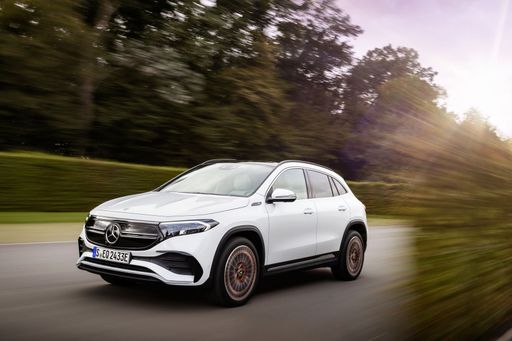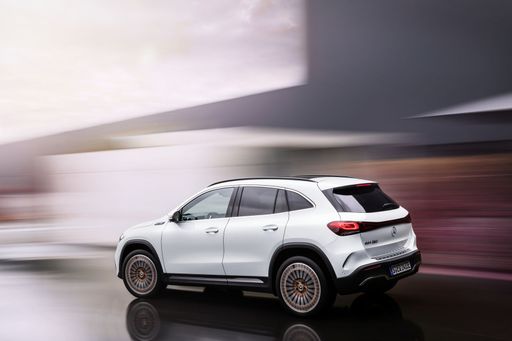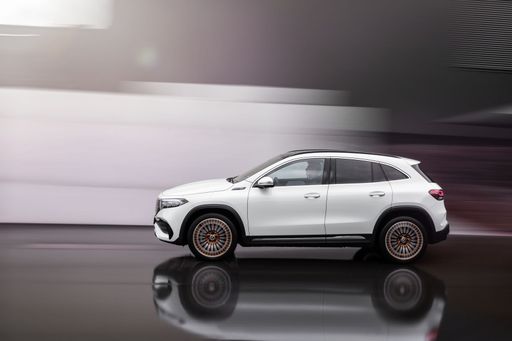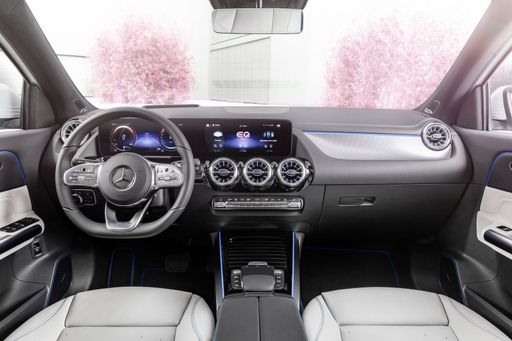Mercedes EQA vs Toyota C-HR - Differences and prices compared
Compare performance (292 HP vs 223 HP), boot space and price (44200 £ vs 29100 £) at a glance. Find out which car is the better choice for you – Mercedes EQA or Toyota C-HR?
Costs and Efficiency:
Price and efficiency are often the first things buyers look at. Here it becomes clear which model has the long-term edge – whether at the pump, the plug, or in purchase price.
Toyota C-HR has a clearly advantage in terms of price – it starts at 29100 £, while the Mercedes EQA costs 44200 £. That’s a price difference of around 15103 £.
As for range, the Mercedes EQA performs clearly better – achieving up to 561 km, about 493 km more than the Toyota C-HR.
Engine and Performance:
Power, torque and acceleration say a lot about how a car feels on the road. This is where you see which model delivers more driving dynamics.
When it comes to engine power, the Mercedes EQA has a clearly perceptible edge – offering 292 HP compared to 223 HP. That’s roughly 69 HP more horsepower.
In acceleration from 0 to 100 km/h, the Mercedes EQA is noticeable quicker – completing the sprint in 6 s, while the Toyota C-HR takes 7.40 s. That’s about 1.40 s faster.
In terms of top speed, the Toyota C-HR performs a bit better – reaching 180 km/h, while the Mercedes EQA tops out at 160 km/h. The difference is around 20 km/h.
Space and Everyday Use:
Whether family car or daily driver – which one offers more room, flexibility and comfort?
Both vehicles offer seating for 5 people.
In curb weight, Toyota C-HR is noticeable lighter – 1505 kg compared to 2045 kg. The difference is around 540 kg.
In terms of boot space, the Toyota C-HR offers noticeable more room – 447 L compared to 340 L. That’s a difference of about 107 L.
In maximum load capacity, the Mercedes EQA performs to a small extent better – up to 1320 L, which is about 165 L more than the Toyota C-HR.
Maximum payload is identical – both can carry up to 425 kg.
Who comes out on top?
Overall, the Mercedes EQA shows itself to be is largely superior and secures the title of DriveDuel Champion.
It convinces with the more balanced overall package and proves to be the more versatile choice for everyday use.

Mercedes EQA
Costs and Consumption
View detailed analysis
Engine and Performance
View detailed analysis
Dimensions and Body
View detailed analysis
Mercedes EQA
The Mercedes EQA slips into the electric crossover ranks with the brand’s familiar luxury polish, offering a quiet, fuss-free drive that feels perfectly at home in the city or on a country escape. Inside it’s neatly finished and tech-forward, projecting grown-up refinement even if it plays things a bit safe for anyone chasing outright excitement.
details



Toyota C-HR
The Toyota C-HR cuts a striking figure with its angular styling and coupe-like profile, so you’ll never go unnoticed in the supermarket car park. It balances everyday practicality with a nimble, city-friendly personality, making routine commutes feel a touch more fun without asking for forgiveness.
details





|

|
|
|
|
Costs and Consumption |
|
|---|---|
|
Price
44200 - 57400 £
|
Price
29100 - 42800 £
|
|
Consumption L/100km
-
|
Consumption L/100km
0.8 - 5.1 L
|
|
Consumption kWh/100km
14.4 - 16.9 kWh
|
Consumption kWh/100km
-
|
|
Electric Range
476 - 561 km
|
Electric Range
68 km
|
|
Battery Capacity
70.50 kWh
|
Battery Capacity
-
|
|
co2
0 g/km
|
co2
17 - 115 g/km
|
|
Fuel tank capacity
-
|
Fuel tank capacity
43 L
|
Dimensions and Body |
|
|---|---|
|
Body Type
SUV
|
Body Type
SUV
|
|
Seats
5
|
Seats
5
|
|
Doors
5
|
Doors
5
|
|
Curb weight
2045 - 2115 kg
|
Curb weight
1505 - 1755 kg
|
|
Trunk capacity
340 L
|
Trunk capacity
350 - 447 L
|
|
Length
4463 mm
|
Length
4362 mm
|
|
Width
1834 mm
|
Width
1832 mm
|
|
Height
1608 - 1613 mm
|
Height
1558 - 1564 mm
|
|
Max trunk capacity
1320 L
|
Max trunk capacity
1076 - 1155 L
|
|
Payload
425 kg
|
Payload
375 - 425 kg
|
Engine and Performance |
|
|---|---|
|
Engine Type
Electric
|
Engine Type
Full Hybrid, Plugin Hybrid
|
|
Transmission
Automatic
|
Transmission
Automatic
|
|
Transmission Detail
Reduction Gearbox
|
Transmission Detail
CVT
|
|
Drive Type
Front-Wheel Drive, All-Wheel Drive
|
Drive Type
Front-Wheel Drive, All-Wheel Drive
|
|
Power HP
190 - 292 HP
|
Power HP
140 - 223 HP
|
|
Acceleration 0-100km/h
6 - 8.6 s
|
Acceleration 0-100km/h
7.4 - 9.9 s
|
|
Max Speed
160 km/h
|
Max Speed
175 - 180 km/h
|
|
Torque
385 - 520 Nm
|
Torque
-
|
|
Number of Cylinders
-
|
Number of Cylinders
4
|
|
Power kW
140 - 215 kW
|
Power kW
103 - 164 kW
|
|
Engine capacity
-
|
Engine capacity
1798 - 1987 cm3
|
General |
|
|---|---|
|
Model Year
2024 - 2025
|
Model Year
2024 - 2025
|
|
CO2 Efficiency Class
A
|
CO2 Efficiency Class
C, B
|
|
Brand
Mercedes-Benz
|
Brand
Toyota
|
Is the Mercedes EQA offered with different drivetrains?
Available configurations include Front-Wheel Drive or All-Wheel Drive.
The prices and data displayed are estimates based on German list prices and may vary by country. This information is not legally binding.
